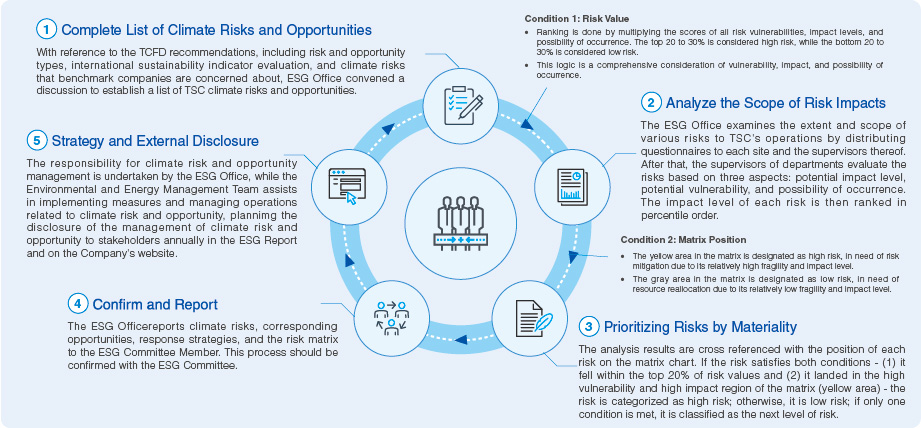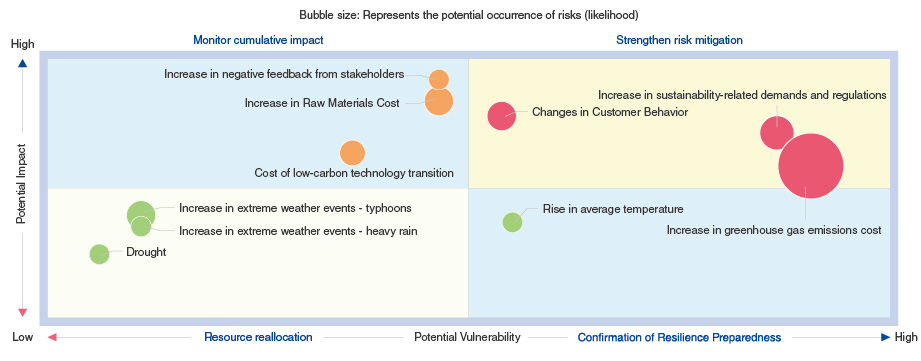Sustainability
Sustainability
Adoption of TCFD
TSC pays close attention to the risks and business opportunities that may arise from climate change, following the Rules Governing the Preparation and Filing of Sustainability Reports by the Taiwan Stock Exchange Corporation and referencing to the climate-related financial disclosure suggestions of the Task Force on Climate-related Financial Disclosures (TCFD). TSC integrates its climate risk and opportunity management mechanism with its corporate risk management process, continuously promoting low-carbon transformation and strengthening the Company’s resilience to climate change through four main directions: governance, strategy, risk management, indicators, and goals.
Climate Governance
In 2022, TSC established the ESG Committee to oversee climate-related risks, opportunities, response strategies, goals, preventive measures, and specific outcomes. The ESG Office will hold at least two annual meetings to report on and discuss the implementation performance of climate change-related issues, risk response strategies, greenhouse gas reduction, renewable energy layout, and water resource utilization with the ESG Committee.
The ESG Committee has established the ESG Office. After formulating relevant sustainability policies and guidelines by ESG Office, the Corporate Social Responsibility Functional Team is responsible for executing these policies. The Environment and Energy Management Team is specifically in charge of climate change-related issues, including achieving annual carbon reduction targets, implementing greenhouse gas reduction plans, and promoting renewable energy development. The Corporate Social Responsibility Functional Team holds cross-site meetings once to twice a month to facilitate mutual learning and exchange among factories on sustainability and climate issues, discussing and discovering solutions to address the potential impacts of climate change on TSC.
Climate Risks and Opportunities
To improve the climate-related risks and opportunities management mechanism, TSC follows the guidelines of the TCFD and has established a climate-related risk management procedure. This procedure consists of the following steps: (1) establishing a climate risk list, (2) analyzing the scope and duration of risk impacts, (3) prioritizing risks by materiality, (4) confirming and reporting, and (5) implementing strategies and disclosing to the public.
In 2022, TSC summarized 10 climate-related risks and three climate-related opportunities by considering the characteristics of operations and evaluating climate risks and opportunities based on potential impact, possibility of occurrence, and potential vulnerability, and referencing the TCFD recommendations, including risk and opportunity types, evaluation of international sustainability indicators, and climate risks that benchmark companies are concerned about. Transition risks include increased greenhouse gas emission costs, increased sustainability-related demands and regulations, and changes in customer behavior; physical risks include short-term risks such as typhoons and heavy rain, and long-term risks such as rising average temperatures. TSC plans to identify and assess climate-related risks and opportunities every three years, considering the frequency, characteristics, and timing of these risks. In the remaining years, TSC will review and confirm the current risks and ensure the adequacy of response measures.

Climate Risk Matrix

Based on the analysis of the materiality of climate risks, an assessment was conducted on the potential impact of the identified 10 risks on operations and financial planning. The corresponding risk response measures are formulated in the Climate-related Risks and Response Measures table.
Based on the impact of climate risks on the operation and value chain of TSC’s business, and the materiality of those risks, the ESG Office assesses related solutions and business opportunities so as to formulate operational strategy adjustment directions and response measures and report to the President, who is responsible for risk management.
In consideration of the possible impact of climate-related risks and opportunities on various aspects of TSC’s operations, the Company actively develops related low-carbon products, green processes, promotes the rollout of renewable energy, and continues to closely monitor climate-related policies. After confirmation by the ESG Committee, TSC continues to promote the implementation in daily operational and risk management procedures.
For more information, please refer to TSC 2022 ESG Report P.33 Chapter 1.3.3 Climate Risk Management.



